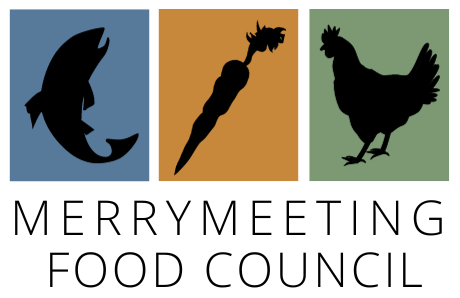The farm bill connects the food on our plates, the farmers and ranchers who produce that food, and the natural resources – our soil, air and water – that make growing food possible.
-National Sustainable Agriculture Coalition (link)
What is the Farm Bill?
The Farm Bill is a massive piece of federal legislation that determines federal spending which impacts all of us through influencing what kind of food farmers’ grow, what management practices they use, how much food costs, and who has access to needed land and resources. As the costs of food and everything else are increasing, we all need to let our legislators know what matters to us.
The bill is reauthorized every 5 years, and the most recent Farm Bill expired on September 30th. House and Senate Agriculture Committees are meeting now about reauthorization, so this is an important time for all of us to learn more about the Farm Bill and how we can shape it.
The Farm Bill impacts the viability of Maine farms and the strength of our rural communities. The largest portion of the spending (76% in the 2018 Farm Bill) supports nutrition programs like the Supplemental Nutrition Assistance Program, but the Farm Bill also includes crop insurance and revenue protection for farms, and funding for conservation programs that help protect our soil, water, and air quality. Reauthorization offers opportunities to transform our food system through shifts in program priorities to increase access to funding for small and medium sized farms, increase support for local and regional food systems, overhaul of programs to ensure racial equity, include fisheries and fishermen in our food system programs (see Maine Coast Fishermen’s Association article), and prioritize climate smart agriculture through policies and incentives.
Why does the Farm Bill matter to Mainers?
There are over 7,600 farms covering 1.3 million acres of land in Maine. Overall, agriculture represents more than 27,000 jobs in Maine and the economic impact of agriculture (from farm to processing and food retail) according to the 2017 USDA Census was $3.6 billion. Decisions made in the coming weeks will impact Maine’s ability to reach goals outlined in the current climate action plan, Maine Won’t Wait, and Maine’s Ending Hunger by 2030 plan. We asked Maine’s legislative delegation why Mainers should care about the Farm Bill heard back from Representative Pingree and Senator King.
Chellie Pingree (U.S. Representative): “It’s important to remember that despite its name, the Farm Bill governs a wide swath of policy areas ranging from broadband to food access and farm financing—giving Congress a once-in-five-years opportunity to build a more sustainable food system and create greater opportunity in rural America,” said Congresswoman Chellie Pingree (D-Maine), a longtime farmer and member of the House Agriculture Committee. “Climate change and ‘forever chemical’ contamination are deeply impacting Maine’s agriculture industry, and nutrition access is top of mind for Mainers across the state. In addition, local producers need more resources for infrastructure so consumers can access locally grown, nutritious foods. These issues align with my Farm Bill goals. As the Agriculture Committee and I ramp up Farm Bill negotiations, I am committed to pushing for a comprehensive bill that addresses these challenges head-on and uplifts rural communities in Maine and across the country. Visit http://Pingree.house.gov/FarmBill to learn more about the legislation and my Farm Bill priorities.”
Angus King (U.S. Senator): “Maine’s farms are critical to our economy, our culture, and our way of life,” said Senator King. “This year’s farm bill reauthorization includes key priorities so that Maine farms can continue to deliver best-in-class products with a push for expanded access to worldwide markets, increased funding for PFAS testing and remediation, reduced barriers for irrigation infrastructure, additional research and development resources, rural housing assistance for working farms, and forest service initiatives. All told, it has the potential to support and grow the success of Maine farms for years to come. I look forward to working closely with my colleagues on both sides of the aisle to ensure that the needs of rural America are addressed.”
Governor Mills’ administration recently released a letter outlining their priorities for funding which you can read here.
What can you do?
If you, or someone you care about, is: a farmer, a farm employee, a food retailer, a recipient of essential support through SNAP, involved in aquaculture, enjoys farm to school programs, attends farmers’ markets, or is an eater…then the decisions happening now around the Farm Bill impact you. Our legislators are hearing from lobbyists across the food system, but they need to hear from you about what matters in your local food system.
There is still time to influence which marker bills move forward and which changes are prioritized in this Farm Bill! During the pandemic we saw the importance of local food producers to the accessibility of food. And we saw the rates of hunger decline in Maine because SNAP benefits were increased temporarily. Our food producers, food system businesses, and our communities need your support.
Your voice matters!
Take a few minutes to call or write to your Representative or Senator and share what is most needed to create stronger and more resilient community-based food systems. Contact: Representative Pingree, Representative Golden, Senator King, Senator Collins
Decide what matters most to you. If you have time to learn more, here are a few resources that we have found helpful. For links to the priorities of several key national organizations and marker bill language, see this article from Food Solutions New England. Maine Farmland Trust policy priorities can be found here. And the Northeast NOFAs and Maine Organic Farmers and Gardeners Association have a shared platform and are directing people to send letters to their legislators via this Action Network page.
For additional learning: The introduction and first full episode of the podcast Farm Bill Uprooted podcast from the Institute for Agriculture and Trade Policy do a fantastic job outlining the breadth of impacts the Farm Bill has on how our food system functions, areas where it has worked, and areas where it needs work.
This was the start of a series created by MFC, the Maine Network of Community Food Councils, and the Maine Food Convergence Project about the impacts of the Farm Bill on climate change, equity in our food system, and more. Find all the posts and resources shared on the Maine Network of Community Food Council’s website! Follow us on Facebook and Instagram to keep up with this conversation and reach out with questions!
Sections of the Farm Bill (from National Sustainable Agriculture Coalition)
Title 1: Commodities: Covers price and income support for the farmers who raise widely-produced and traded non-perishable crops, like corn, soybeans, wheat, and rice - as well as dairy and sugar. The title also includes agricultural disaster assistance.
Title 2: Conservation. The Conservation title covers programs that help farmers implement natural resource conservation efforts on working lands like pasture and cropland as well as land retirement and easement programs.
Title 3: Trade. The Trade title covers food export subsidy programs and international food aid programs.
Title 4: Nutrition. The Nutrition title covers the Supplemental Nutrition Assistance Program [SNAP] (formerly known as food stamps) as well as a variety of smaller nutrition programs to help low-income Americans afford food for their families.
Title 5: Credit. The Credit title covers federal loan programs designed to help farmers access the financial credit (via direct loans as well as loan guarantees and other tools) they need to grow and sustain their farming operations.
Title 6: Rural Development. The Rural Development title covers programs that help foster rural economic growth through rural business and community development (including farm businesses) as well as rural housing, and infrastructure.
Title 7: Research, Extension, and Related Matters. The Research title covers farm and food research, education, and extension programs designed to support innovation, from federal labs and state university-affiliated research to vital training for the next generation of farmers and ranchers.
Title 8: Forestry. The Forestry title covers forest-specific conservation programs that help farmers and rural communities to be stewards of forest resources.
Title 9: Energy. The Energy title covers programs that encourage growing and processing crops for biofuel, help farmers, ranchers and business owners install renewable energy systems, and support research related to energy.
Title 10: Horticulture. The Horticulture title covers farmers market and local food programs, funding for research and infrastructure for fruits, vegetables and other horticultural crops, and organic farming and certification programs.
Title 11: Crop Insurance. The Crop Insurance title provides premium subsidies to farmers and subsidies to the private crop insurance companies who provide federal crop insurance to farmers to protect against losses in yield, crop revenue, or whole farm revenue. The title also provides USDA’s Risk Management Agency (RMA) with the authority to research, develop, and modify insurance policies.
Title 12: Miscellaneous. The Miscellaneous title is a bit of a catch-all. The current title brings together six advocacy and outreach areas, including beginning, socially disadvantaged, and veteran farmers and ranchers, agricultural labor safety and workforce development, and livestock health.
Who writes the Farm Bill?










